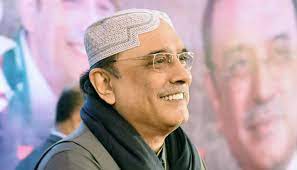Zardari first civilian to return as President for a second term

Celina Ali
Islamabad: Pakistan People’s Party (PPP) supremo Asif Ali Zardari is the first civilian to be elected as the President for a second term after the presidential elections.
Zardari previously served as the President from 2008 to 2013.
Dr Arif Alvi, the outgoing president whose five-year term ended last year, had continued in office pending the formation of the new electoral college.
Zardari is the widower of the late Prime Minister Benazir Bhutto. The 68 years old serves as the co-chairman of the PPP and enjoys the support of the coalition government led by the Pakistan Muslim League (Nawaz), which holds the required majority to ensure his victory.
This election follows a reciprocal agreement after the fractured mandate from the February 8 polls. The PPP supported the PML-N’s candidate for the Prime Minister’s slot, and in return, PPP’s nominee was approved for the President’s slot.
Zardari’s main challenger was Mahmood Khan Achakzai, head of the Pashtoonkhwa Milli Awami Party (PkMAP), who contested from the platform of the Sunni Ittehad Council (SIC), which gained prominence after independent candidates backed by the jailed former Prime Minister Imran Khan’s Pakistan Tehrik-e-Insaf (PTI) joined its ranks.
The ruling coalition was confident in Zardari’s election for a second term as President, given their majority in the Senate, National Assembly, Punjab Assembly, Sindh Assembly, and Balochistan Assembly. The opposition held a majority only in the Khyber Pakhtunkhwa assembly.
The presidential election process, as outlined in the Constitution, involves an electoral college comprising federal and provincial lawmakers.
Pakistan’s first President was Iskandar Mirza, who assumed office on March 23, 1956, following the adoption of the first Constitution and the country’s establishment as a republic. Prior to this, the country was led by Governor-Generals.
With hours remaining until the presidential elections, Achakzai, the candidate backed by the PTI, had demanded a postponement of the elections.
In a letter to the Election Commission of Pakistan (ECP), Achakzai highlighted the ‘incomplete electoral college,’ citing vacant reserved seats in the national and provincial assemblies.
He argued that conducting the presidential election as scheduled would deny the votes of those seats, which goes against “fundamental rights, laws, and the Constitution.” The elections however, were held as planned.





